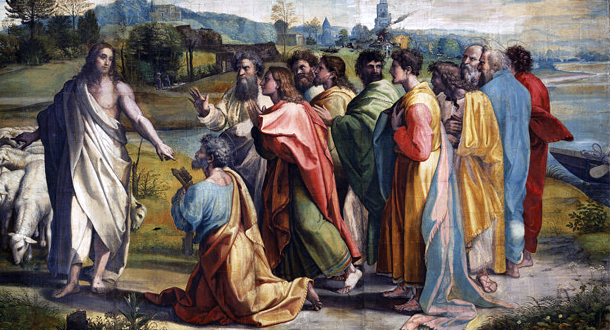
Scripture:
Acts 5:27-32, 40-41
Revelation 5:11-14
John 21:1-19
Reflection:
BREAKFAST ON THE SHORE
One of the true gifts I have been given in my life has been the frequent opportunity (as part of my job at Catholic Theological Union) to guide groups visiting the Holyland. Whenever I stand on the northwest shore of the Sea of Galilee, the exquisite scene we hear from today’s Gospel reading comes to mind without fail.
Chapter 21 of John’s Gospel comes as unexpected. The final resurrection appearance of Jesus in Jerusalem to “doubting Thomas” we heard last Sunday seems to be the finale, and John ends with a closing statement: “But these [things] are written that you may believe that Jesus is the Messiah, the Son of God, and that through this belief you may have life n his name.”
But suddenly the screen lights up again and we find ourselves with the apostles by the Sea of Galilee. Seeming dispirited, Peter decides to go fishing and other disciples (including the Beloved Disciple) join him. They fish all night but catch nothing. With the light of dawn, they see someone standing on the shore who asks them, “Lads, have you caught anything to eat?” ‘No,” they answer.
And this strange yet familiar presence tells them to let down their net on the right side of the boat. They do so and now everything changes: they catch a net-breaking load of fish (153 large ones…), and suddenly the Beloved Disciple knows who that mysterious figure is. “It is the Lord.” Peter, ever impulsive, puts on his tunic and swims ashore, leaving his companions to haul in the loaded net.
Now the drama of the story intensifies even more. Jesus, the Risen Christ and the Lord of the Universe, is cooking a meal for his disciples over a charcoal fire! “Come, have breakfast,” he says. He serves them baked bread and grilled fish, fresh from their catch. No scene in all the New Testament is like this. As had the disciples on the way to Emmaus in Luke’s account, these disciples also recognize Jesus “in the breaking of the bread,” but they are too astounded to say a word.
Finally, Jesus himself breaks the silence and looks to Simon Peter, the disciple who had denied three times that he even knew Jesus while his beloved Master stood trial. Now there will be a threefold healing of Simon’s failure: “Simon, son of John, do you love me more than these? Feed my lambs…feed my sheep.” Stricken, Peter finally exclaims, “Lord, you know everything; you know that I love you.” A breech of love healed by love.
So much of the Easter message is transmitted in the Gospels by indirection: an empty tomb; burial cloths neatly folded; the abject grief of Mary Magdalene turned into ecstasy; wounds earned by love on display; Thomas’ skepticism turned into ardent faith; disciples huddled in fear given the gift of peace and suffused with God’s own Spirit.
And here by the familiar shore of the Sea of Galilee, fishermen who caught nothing all night pull in nets breaking with an abundant catch when they are responsive to Jesus’ words. And just as Jesus had dined with them in the home of Mary and Martha, in the fields with the crowds, at a final poignant Passover on the eve of his death—so, now, the Master cooks them a breakfast of bread and fish and serves them.
And at this wondrous meal, another Easter transformation takes place. Peter, broken still by remorse at his own failure, is healed by a threefold confession of love. Healed and reinstated as the shepherd of Jesus’ flock, “feed my lambs, feed my sheep.”
Within each of us there are chronic responses and failures that we wonder if they can ever be changed or healed. We look around our world today and see the fierce violence, the needless suffering of the innocent, the lack of justice and equity—and we wonder if we can ever make headway as a people and a church.
The Easter message of the Gospel keeps insisting: life is stronger than death; love is more tenacious than hatred. We are invited to let our nets down once more for a catch.
Fr. Donald Senior, C.P. is President Emeritus and Professor of New Testament at Catholic Theological Union. He lives at the Passionist residence in the Hyde Park neighborhood of Chicago.
[This column is adapted with permission from Fr. Senior’s weekly column “Perspectives on Scripture” which appears in The Chicago Catholic.]
